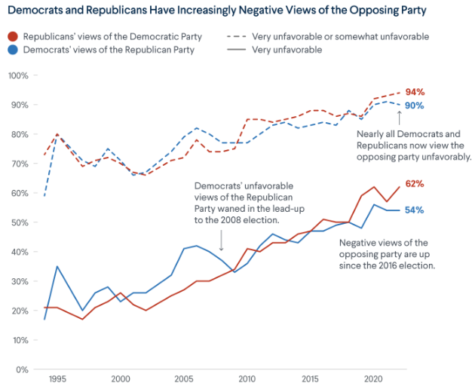10 years of Super Meat Boy: a retrospective
November 13, 2020
If you were a player of the Xbox Live Arcade or Steam back in the earlier days, then you’re likely to have heard of Super Meat Boy (SMB). I should know, as I was one of them. The game, as I knew it then and as I know it now, is responsible for making up a fundamental part of my childhood.
On Oct. 20th, the critically acclaimed masterpiece of a precision platformer became due for its 10th anniversary. For a game of its time, it still holds up to this day, and for that reason and for many more, players should continue to fondly remember it for many more years to come.
The Review

In Super Meat Boy, you play the role of a cube of meat named Meat Boy, who is on a journey to save his bandage-covered girlfriend from a baby in a robot suit named Dr. Fetus. In order to save Bandage Girl, Meat Boy must masterfully run and jump his way through levels full of buzzsaws and myriad other lethal obstacles that will spell his doom upon a single touch.
The way Meat Boy controls is amazingly dynamic and fluent; he is a lot faster and more aerodynamic than what other platformers would have you come to expect, and with how pronounced each of his jumps is, there is virtually no ceiling for just how pinpoint his accuracy could become. Having a control scheme consisting of nothing other than a seemingly basic run and jump, each level is perfectly crafted to complement those controls, and nothing from level to level will ever come across as repetitive.
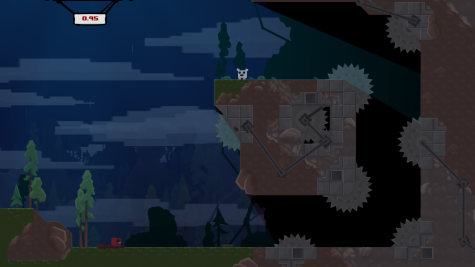
The aura this game commonly gives off is one of a ‘rage game’ in the vein of titles such as I Wanna Be the Guy, but playing SMB is an entirely separate experience. By design, gameplay is actually fun above all else and never at all frustrating. The developers at Team Meat wanted to maximize entertainment and minimize frustration with its game model; to do this, they implemented a simple, yet genius, formula: Gameplay is remarkably fast-paced, and it always prioritizes rewarding players over penalizing them.
In this game, the player’s going to be doing a lot of dying; in that case, why not attempt to waste as little of the player’s time as possible? Having to wait to get back in the action is just about the most frustrating part of any game, and the developers understood this. Thus, they gave players infinite lives, short levels, and split-second respawn times. The penalty for death in the game is nothing more than the time previously spent getting to that last spot in the level, and with each level being merely seconds long, this design choice becomes an immense breath of fresh air.
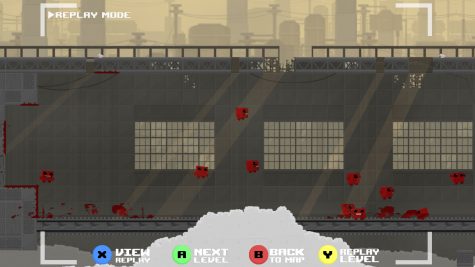
This game is great at nurturing its players into seasoned veterans; it subtly feeds its players crumbs of increasingly intricate challenges gradually throughout the campaign, and by the end of it all, players never have to wonder how to pull off any maneuver, but rather when to apply it. Players are always given positive feedback on a level’s completion with a replay of every attempt of that level at once; this gives the player a nice visual of what gave them trouble and how they eventually grew to overcome it.
Once the training wheels are off, a path is paved towards an entirely new and vast world to explore. Each level has a ‘Dark World’ expert mode counterpart, and sparsely hidden throughout each chapter are a few ‘warp zone’ portals to retro-themed levels. Sprinkled throughout just about everywhere in the game are risky-to-collect ‘bandages’ used to unlock playable characters with their own special abilities. The sheer number of challenges ahead of you may seem daunting, but when players can expect to be rewarded with an entirely new way to play the game, then what better incentive is there?
All of this is a completionist’s dream come true. There was always something especially alluring to me as a kid about the idea of doing it all. Only when I recently rediscovered my interest in this game did I pull off in nine days what I couldn’t do as a kid in several months: I beat the game to 106 percent completion; it was an absolute rollercoaster, to say the least. By the end of it all, I developed skills great enough to beat entire chapters without dying, allowing me to accumulate half of what the game calls its ‘Iron Man’ achievements.
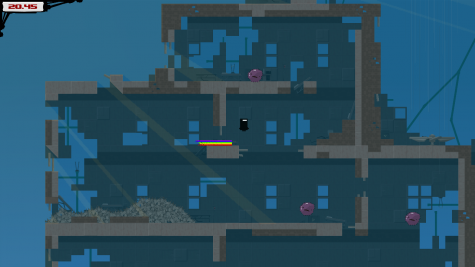
From the sidelines, gameplay of SMB may seem like a difficult time, but words can’t even begin to describe how oversimplified such an outlook on the game is and how much this game exceeds players’ expectations from just what they are given on paper. First and foremost, the average player will never be required to do anywhere near all that I have done in my playthrough in order to beat the game and to enjoy it. I am confident in saying that Super Meat Boy is a must-play; you will not regret getting your hands on it.
The Development
Super Meat Boy was made as a collaborative effort between game designer Edmund McMillen and his programmer friend Tommy Refenes. McMillen’s game development résumé had consisted of the award-winning indie title Gish, as well as several smaller Flash games he posted to Newgrounds. This impressed Microsoft and Nintendo enough for them to contact him about developing a game for their consoles.
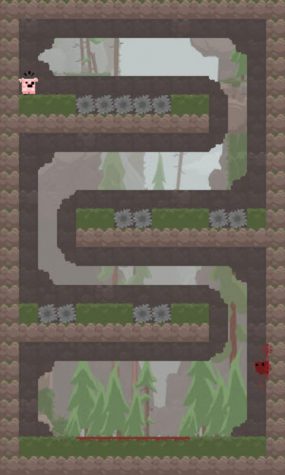
It was then that McMillen and Refenes became Team Meat, and they began setting their sights on a full reimagining of McMillen’s most popular Flash game, Meat Boy. What the team valued above all else was to have fun making their game the way they envisioned it, and they weren’t going to let higher-ups in business suits tell them how their game should have been made.
While spreading the word of their new upcoming title and encouraging followers to support indie development, Team Meat made arrangements behind the scenes with several figurehead indie developers to have their titular characters be playable in the new game. This roster became massive, featuring characters from VVVVVV, N+, World of Goo, Castle Crashers, Half-Life, and even Minecraft. With the overwhelming support from the community, Team Meat had made the impossible possible.
As indie developers, things didn’t come easy. Emergency gallbladder surgery sunk McMillen tens of thousands of dollars in debt, and the team found itself cramming 12 hours of work a day in the last two months of development in order to meet a deadline for an Xbox Live Arcade promotion they thought they couldn’t have survived without. Team Meat additionally faced sabotage by Microsoft, who stifled the team’s promotion after telling them their game was projected to underperform.
In the end, everything worked out for Team Meat, and their game performed exponentially better than they ever could have hoped for. Since then, Edmund McMillen has gone on to create the much more successful The Binding of Isaac franchise, and Tommy Refenes has gone on to lead an ongoing effort in creating a successor to the original Super Meat Boy.
The Sequel
A sequel of SMB has been in the works for quite some time, and it is quite different from its predecessor. In Super Meat Boy Forever, Dr. Fetus has kidnapped Meat Boy and Bandage Girl’s daughter Nugget, and the two protagonists refuse to slow down as they take on a very long enemy-inhabited and buzzsaw-ridden road in order to reach Nugget at the end. The two have gained the ability to fight back against their environment but have lost control over their own speed and direction. This game is an auto-runner, and the protagonists cannot stop running.
The choice to go this direction with development was one spawned from a feeling of fulfillment with SMB’s success. Many people believe in a rule of ‘if it isn’t broken, then don’t fix it,’ but Team Meat believed there was truly nothing more to be done with the old formula, and they had already passed the torch to the player with SMB’s level editor. A new game called for a new spin on things, and thus a prototype for a new mobile auto-runner was underway for development.
As time occupied the both of them, McMillen left Team Meat to pursue continuing to develop titles in his The Binding of Isaac franchise, and Refenes found himself preoccupied with a family to look over. Three years of living life outside of game development allowed Refenes to come back refreshed and transform what was supposed to be a quick mobile spin-off into a full-fledged successor to the original. He hired a cast for the new Team Meat and deconstructed the original prototype for it to be sufficiently built back up.
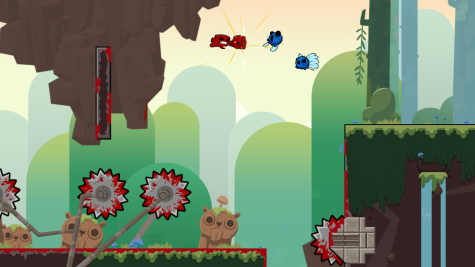
Forever’s newfound selling point is that each level is full of a bunch of individual-level chunks that are stitched together based upon what the game perceives to be the player’s skill level, and with the sheer amount of chunks in each level, you’ll have gone through ten full playthroughs of the entire game by the time you stumble upon a chunk that you’ve seen before. Also, the added charge, slide, and dive attacks give gameplay just that extra bit of nuance that wasn’t there in the original, as well as making boss battles that much more of a dynamic experience.
While some are skeptical of this new approach, Refenes insists that Forever will provide the superlative Super Meat Boy experience. He puts stock in the idea that the game’s challenges leave players to their bare reflexes, which is what Refenes thought to be his favorite part of SMB’s gameplay. Refenes and his team are certainly satisfied with the game’s new coat of paint, and he is confident that fans will not be disappointed once the wait is over.
With Forever’s roots being sprouted in mobile gaming, Refenes will be the first to assure you that it has evolved to be much more beyond that. He rejects giving Forever the moniker of ‘endless runner,’ emphasizing that each level has a start and an end, and he insists that the two buttons the player is given is more than enough to complement the playstyle in a way that allows for the precision that SMB players have come to expect.
Detractors like to throw around ‘how watered down the gameplay looks,’ but looks can be deceiving. Gameplay for SMB and Forever look just about as simple as each other on the surface, yet I would have never have learned just how great and nuanced the original SMB gameplay experience was without sitting down to play it. You shouldn’t knock something until you’ve tried it, and you will never discover how good something truly is until you’ve tried it.
As for current development status, this game has been in development for three years now and still has no confirmed release date. What’s the hold up? It’s simple: Refenes just doesn’t want a repeat of the final two months of SMB’s development where stress would get the better of him and his team. Plus, with over 5,000 level chunks planned to be in the final game, it’s not like the amount of time the team is taking is by any measure unreasonable. Team Meat has made their case, so we should continue to let them take as much time as they need in making this game.
With such an ambitious change made to a classic formula, I understand why others would initially be apprehensive towards this new title; however, it never hurts to give something new a chance. I want to relive the once-in-a-lifetime experience I had when Super Meat Boy surprised and impressed me with how such a simple formula could be ever-so intuitive and entertaining. That is why I look forward to Super Meat Boy Forever, and that is why you probably should too.
The Conclusion
When it comes to precision platformers, Super Meat Boy is a cornerstone and is just about the pinnacle; it arguably revolutionized the genre, turning the concept of a game meant only to cause frustration into one of a fun and entertaining experience that rewards and motivates gradual growth of skill. It’s hard to believe that a game that stands the test of time so well is already 10 years old. Yet it is, and we’re all here to celebrate its anniversary.
Happy 10th anniversary, Super Meat Boy!








